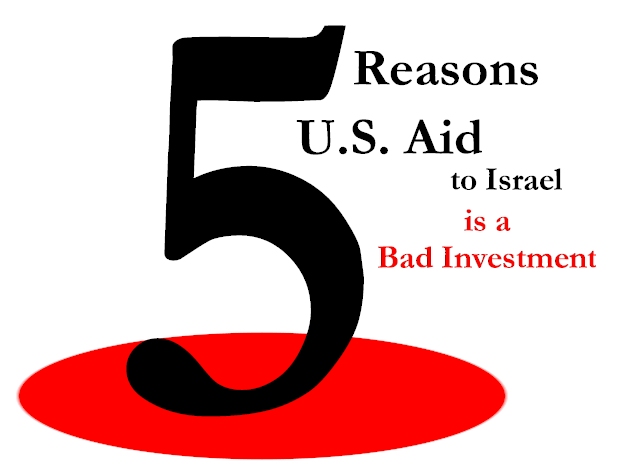|
|
Contractor |
Employees |
2015 Revenue |
|
Lockheed Martin |
98,000 |
$
46,132,000,000 |
|
Boeing |
156,921 |
$
96,110,000,000 |
|
Raytheon |
61,000 |
$
23,000,000,000 |
|
General Dynamics |
99,500 |
$
31,500,000,000 |
|
Northrop Grumman |
65,000 |
$
24,661,000,000 |
|
Total |
480,421 |
$
221,403,000,000 |
|
|
|
|
|
Revenue Required to Support a single job |
$
460,852 |
However, Israel’s largest U.S. "purchases" by volume are not high-tech goods, but rather the jet and diesel fuel it needs to reach its ever-growing number of designated enemies both in territories it illegally occupies and neighboring countries. In April, 2016 Israel notified Congress of its need for 864 million gallons of aviation and diesel fuel on average priced at $3.09 per gallon. Such commonplace commodity purchases drag the number of jobs supported in the U.S. by the MOU down to embarrassingly low levels.
Redirecting such tax dollars to projects inside the U.S., in particular for rebuilding desperately-needed infrastructure, would employ many more Americans per dollar spent than military contractors while providing tangible benefits to the commonweal. The U.S. construction industry supports a job for every $174,000 in output. The proposed $5 billion in aid proposed for Israel could instead unleash the restoration power of nearly thirty-thousand American construction workers—rather than a future of bloody Israeli military onslaughts on Gaza or Lebanon or yet-to-be determined targets.
3. U.S. aid enables Israel to forever avoid a meaningful peace deal
Back in 1960, the U.S. Central Intelligence Agency predicted what has since come to pass. If Israel were able to achieve military hegemony in the region, it would lose interest in pursuing peace with the Palestinians and its neighbors through meaningful and justified concessions. The very aid that most Americans now oppose makes resolving the oldest, most disruptive conflict in the region impossible. In turn, U.S. support generates periodic blowback against the U.S., in the form of oil embargoes, terror attacks and loss of goodwill across the globe.
4. U.S. aid to Israel offsets Israel’s nuclear weapons development costs
The
CIA’s special national intelligence estimate based its
prediction of Israeli regional military hegemony on its
acquisition of nuclear weapons. Since the beginning, Israel
has relied on being able to
surreptitiously source materials, know-how and
technology from the U.S. and evade punishment when its
agents were caught in the act. Charities raising
hundreds of millions in the United States, such as the
American Committee for the
Weismann Institute for Science count on the IRS and
the rest of the U.S. Treasury to look the other way and pretend clandestine
nuclear weapons development has some sort of social welfare
function. American taxpayer dollars devoted to providing
Israel with military goods including nuclear capable
aircraft and commodities therefore offset, subsidize and
empower Israel’s clandestine development of nuclear weapons.
This situation—well known and endlessly explored in foreign
news media—makes the United States the butt of jokes at
Nuclear Nonproliferation Treaty (NPT) conferences.
In the
mid-1970s, during investigations into the illegal diversion
of weapons-grade uranium from U.S. contractor
NUMEC
to Israel, Senators Stuart Symington (D-MO) and John Glenn
(D-OH) amended the 1961 Foreign Assistance Act to ban any
U.S. aid to clandestine nuclear powers that were not NPT
signatories.
Since the law went into effect foreign
aid including estimated assumed intelligence support—which
the CIA refuses to divulge
under the Freedom of Information Act—has reached an
inflation-adjusted $234 billion in taxpayer outlays.
Eager to secure the political support and related campaign
contributions from America’s soon-to-be $6 billion per year
Israel lobby ecosystem, administrations flout the
law by pretending not to know whether Israel has nuclear
weapons, despite ample information in the public and
government domain.
At this critical juncture, America’s only hope is that the courts issue an injunction against future illegal aid —and order an overdue claw back of the $234 billion unlawfully distributed in the past—to be spent on legitimate purposes in the future. This judicial act would remedy a boondoggle so vast, entrenched and long-running it makes even scandals such as Teapot Dome seem like tempests in teacups.
Grant F. Smith is the author of the new book,
Big Israel: How Israel's Lobby moves America.
On August 8, 2016 he filed a
lawsuit in federal court to
block U.S. foreign aid to Israel and claw back aid illegally
delivered since 1976.

